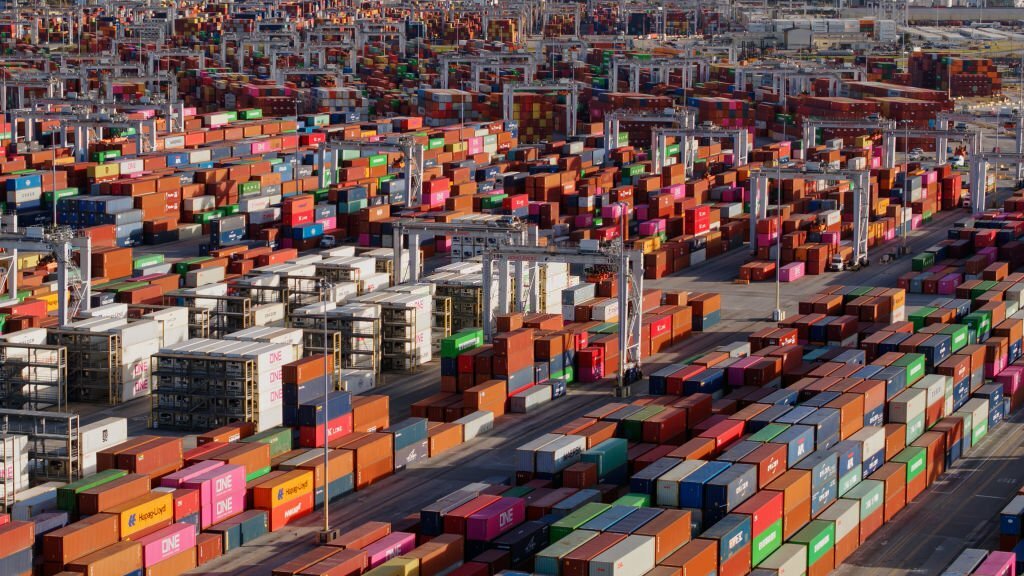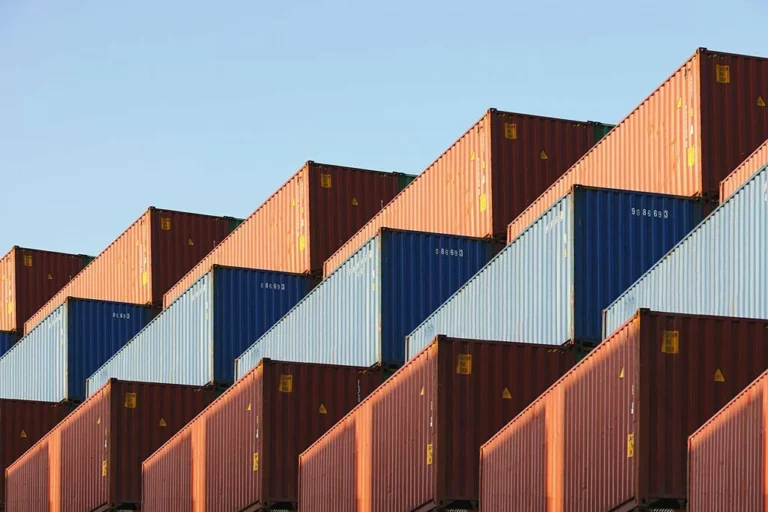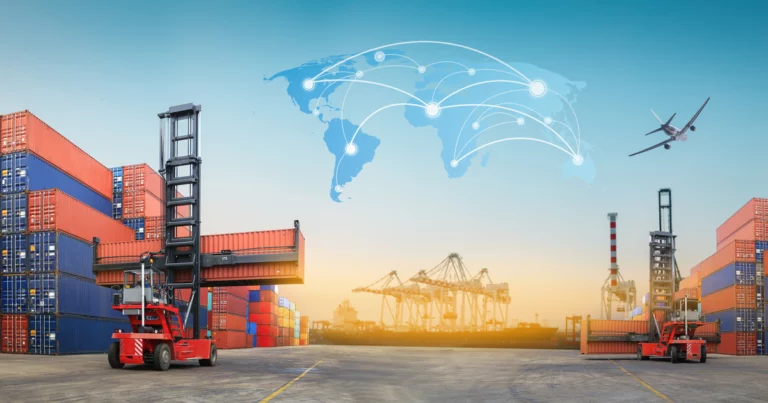Freight Forwarder: Your Strategic Partner in 2025’s Global Trade
Introduction
Freight forwarding is a multifaceted and essential service within the global logistics and supply chain industry. It encompasses a wide range of activities related to the transportation of goods, bridging the gap between shippers (individuals or businesses) and various transportation providers, such as ocean carriers, air freight companies, trucking companies, and rail operators. Freight forwarders play a pivotal role in facilitating the smooth movement of goods from origin to destination, handling everything from booking cargo space to customs documentation.
From securing cargo space to navigating customs protocols, these experts play a pivotal role in ensuring the smooth flow of goods from origin to destination. In this era of heightened connectivity and globalization, finding the right freight-forwarding partner is paramount to business success.
Freight Forwarding Demystified: A 2025 Perspective
Freight Forwarding in a Digital World
The digital revolution sweeping through the shipping and logistics industry is fundamentally transforming the landscape of freight forwarding services. Businesses are increasingly adopting digital technologies to optimize their operations, and freight forwarders are at the forefront of this digital transformation. They leverage advanced tools and platforms to enhance efficiency, visibility, and customer experiences.
- Impact of Digitalization:
Digitalization has brought about a significant shift in how freight forwarders operate. It has unlocked new levels of automation, connectivity, and data-driven decision-making. By harnessing digital technologies, forwarders can streamline processes, improve collaboration, and provide value-added services to their clients.
- Automation and Efficiency:
Automation is central to the digital revolution in freight forwarding. Forwarders are deploying sophisticated tools and robotics to streamline repetitive tasks like booking and documentation. Automated systems not only speed up processes but also reduce errors and optimize resource utilization, leading to greater operational efficiency.
- Real-Time Visibility:
Digitalization enables real-time visibility into cargo movements. Technologies like GPS, RFID, and IoT sensors, along with cloud-based platforms, allow forwarders to monitor shipments’ whereabouts and conditions in real time. This visibility empowers them to manage exceptions, mitigate risks, and optimize supply chain performance proactively.
- Enhanced Communication Channels:
Digitalization has revolutionized communication within the freight-forwarding ecosystem. Cloud-based collaboration platforms and mobile apps facilitate seamless communication and information exchange among forwarders, shippers, carriers, and other stakeholders. These digital channels enable faster decision-making and improved collaboration, fostering stronger partnerships.
- Data Analytics and Predictive Insights:
Forwarders leverage data analytics to analyze large volumes of data and extract actionable insights. Predictive analytics help them anticipate supply chain disruptions, optimize routes, and address potential issues proactively. This enhances operational resilience and customer satisfaction.
- Customer-Centric Solutions:
Digital platforms enable forwarders to offer personalized solutions tailored to individual clients’ needs. Customizable dashboards and self-service portals empower customers to track shipments and manage logistics operations in real-time. These solutions enhance transparency, visibility, and customer satisfaction.
Comprehensive Services Offered by Freight Forwarders
Freight forwarders are the unsung heroes of the global supply chain, offering a plethora of services to ensure the smooth sailing of goods across borders. Here’s a detailed rundown of what these logistical wizards bring to the table:
1. Getting Things Moving:
Think of freight forwarders as the conductors of the shipping orchestra. They handle everything from booking cargo space to arranging transportation by road, rail, air, or sea, making sure your goods reach their destination on time and intact.
2. Navigating Customs:
Crossing international borders can be a bureaucratic minefield, but freight forwarders are well-versed in the art of customs clearance. They handle all the paperwork and red tape, ensuring your shipments comply with regulations and sail through without a hitch.
3. Storage and Distribution:
Need a place to park your goods temporarily? Freight forwarders have got you covered with their warehousing and distribution services. They manage inventory, fulfill orders, and keep things ticking along smoothly in the distribution center.
4. Peace of Mind with Insurance:
Shipping can be unpredictable, but freight forwarders offer cargo insurance to cushion the blow in case of loss, damage, or theft during transit. It’s like having a safety net for your precious cargo.
5. Keeping an Eye on Things:
With state-of-the-art tracking systems, freight forwarders provide real-time updates on your shipments, giving you peace of mind and unparalleled visibility into your supply chain.
6. Packing and Labeling Expertise:
From bubble wrap to barcodes, freight forwarders know how to package and label your goods to meet shipping standards and ensure safe handling throughout the journey.
7. Staying Ahead of Risks:
Freight forwarders are seasoned risk managers, always on the lookout for potential pitfalls in the shipping process. They’ll help you navigate rough seas and avoid delays with their strategic planning and contingency measures.
8. Dotting the I’s and Crossing the T’s:
When it comes to documentation and compliance, freight forwarders are the pros. They’ll handle all the paperwork, from bills of lading to export declarations, so you can focus on growing your business.
9. Pooling Resources with Consolidation:
Need to fill up a container or consolidate shipments? Freight forwarders excel at optimizing cargo space and reducing costs by combining shipments from multiple sources into a single load.
10. Tailored Solutions for Every Need:
Whether you’re shipping perishable goods or hazardous materials, freight forwarders offer specialized services to meet your unique requirements, ensuring your cargo arrives safely and on schedule.
Connecting with a Freight Forwarder
At GoComet, businesses can discover a dedicated platform designed to connect them with trusted freight forwarders. Here, you’ll find a curated list of vetted forwarders, ensuring reliability and quality service. GoComet’s platform offers tailored solutions to match your unique logistics requirements, whether it’s transportation management, customs clearance, or specialized services. With easy navigation and a user-friendly interface, finding the perfect freight forwarder for your business has never been easier.
The Freight Forwarder’s Role in Compliance and Customs
Freight forwarders play a pivotal role in ensuring compliance with international shipping regulations, serving as essential partners for businesses engaged in global trade.
- Understanding Compliance Requirements:
Freight forwarders are well-versed in the myriad of regulations governing international trade, including customs laws, import/export restrictions, and trade compliance standards. They stay updated on the latest regulatory changes and requirements, ensuring that shipments comply with all applicable laws and regulations.
- Documentation and Paperwork:
One of the primary responsibilities of freight forwarders is managing the documentation and paperwork required for customs clearance. They assist businesses in preparing accurate and complete shipping documentation, including commercial invoices, packing lists, and certificates of origin. By ensuring that all documentation is in order, forwarders help expedite the customs clearance process and minimize the risk of delays or rejections.
- Customs Clearance Expertise:
Navigating customs clearance can be a daunting task, especially for businesses unfamiliar with the intricacies of international trade regulations. Freight forwarders leverage their expertise and experience to facilitate smooth customs clearance processes. They liaise with customs authorities on behalf of their clients, ensuring that shipments are processed efficiently and compliantly.
- Tariff Classification and Valuation:
Freight forwarders assist businesses in determining the correct tariff classification and valuation of their goods for customs purposes. They help identify applicable duty rates, taxes, and fees, ensuring accurate cost calculations and minimizing the risk of customs disputes or audits.
- Trade Compliance Management:
In addition to customs clearance, freight forwarders also play a key role in trade compliance management. They help businesses navigate export controls, sanctions, and trade embargoes imposed by various countries. By ensuring compliance with trade regulations, forwarders help mitigate the risk of non-compliance penalties and legal repercussions.
Navigating Customs with a Skilled Freight Forwarder
Partnering with the right freight forwarder can streamline customs processes and alleviate the burden of compliance for businesses engaged in global trade.
Benefits of Partnering with a Skilled Forwarder:
1. Expert Guidance: Skilled freight forwarders provide expert guidance and advice on navigating customs regulations, ensuring that shipments comply with all legal requirements.
2. Efficient Documentation: Forwarders assist businesses in preparing accurate and complete documentation for customs clearance, minimizing the risk of delays or rejections.
3. Customs Brokerage Services: Freight forwarders offer customs brokerage services, handling customs formalities and procedures on behalf of their clients to expedite clearance processes.
4. Risk Mitigation: By ensuring compliance with customs regulations, skilled forwarders help mitigate the risk of fines, penalties, and shipment delays due to non-compliance issues.
5. Cost Savings: Streamlining customs processes with the help of a skilled forwarder can result in cost savings through reduced administrative expenses and faster clearance times.
Choosing the Best Freight Forwarder in 2025
Choosing the right freight forwarder is crucial for businesses engaged in global trade, as it can significantly impact the efficiency and success of their logistics operations. To aid in this selection process, GoComet provides a comprehensive database of vetted freight forwarders, equipped with various tools and features to help users make informed decisions.
Criteria for Selecting a Freight Forwarder
1. Experience and Expertise: Look for forwarders with a proven track record and extensive experience in handling shipments similar to yours. Consider their expertise in specific industries, transportation modes, and geographic regions.
2. Global Network: Assess the forwarder’s network of agents and partners worldwide to ensure they can provide comprehensive coverage and support for your international shipments.
3. Service Offerings: Evaluate the range of services offered by the forwarder, including transportation modes, customs brokerage, warehousing, and value-added services. Choose a forwarder that can meet your specific logistics requirements.
4. Technology and Innovation: Consider forwarders that leverage technology and innovation to streamline logistics processes, improve visibility, and enhance communication. Look for features like real-time tracking, digital documentation, and online collaboration platforms.
5. Compliance and Security: Ensure that the forwarder complies with all relevant regulations and industry standards, including customs compliance, security certifications, and insurance coverage. Verify their credentials and certifications to ensure reliability and trustworthiness.
Leverage GoComet’s forwarder database to narrow down options based on location, services, and expertise. Review vetted forwarders’ profiles, including experience and technology. Read user reviews for insights, and request quotes, and proposals for comparison. Connect directly with chosen forwarders to discuss logistics needs. With GoComet, streamline forwarder selection, enhancing logistics efficiency and global trade success.
The Future of Freight Forwarding
As the logistics landscape continues to evolve, technological advances are poised to revolutionize freight forwarding. Emerging technologies such as artificial intelligence (AI), blockchain, and the Internet of Things (IoT) are expected to play a pivotal role in shaping the future of freight forwarding services.
AI-driven predictive analytics will enable forwarders to optimize routing and anticipate potential disruptions, leading to more efficient supply chain operations. Blockchain technology will enhance transparency and security in document management and transactions, reducing delays and errors. IoT devices embedded in shipments will provide real-time tracking and monitoring, ensuring greater visibility and control over cargo movement. These technological advancements will not only streamline processes but also drive innovation and efficiency in the freight forwarding industry, ultimately benefiting businesses and consumers alike.
Conclusion
In wrapping up, it’s evident that freight forwarders play a vital role in the global logistics landscape, acting as the linchpin that ensures the smooth movement of goods across borders. Their expertise in navigating complex regulations and optimizing supply chain efficiency is indispensable for businesses aiming to succeed in the global marketplace. To find the perfect freight forwarding partner tailored to your specific needs. With the right partner by your side, you can confidently navigate the intricacies of global trade and seize opportunities for growth and expansion.






